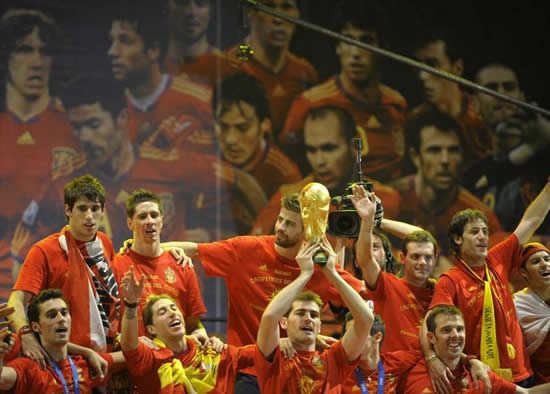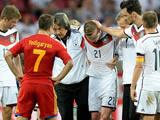World Cup 2014: Spain chase the 'impossible' dream of a fourth successive title
Sunday, June 08, 2014 by Independent.co.uk
Success is second nature to the champions but Miguel Delaney believes another straight title will be a step too far
For a manager so famously easy going, Vicente del Bosque took a conspicuously hard line last week. The Spain coach was discussing the idea of becoming only the second manager to win the World Cup twice, after Italian Vittorio Pozzo in 1934 and 1938. "It is almost impossible," Del Bosque stated. Many think the same about Spain's chances in Brazil where few view the champions as favourites.
History is against them. No country has retained the World Cup since Brazil in 1962; no European side has ever won it in the Americas and no nation has won four trophies in a row. The recent past does not bode that well either. Spain were bulldozed 3-0 by Brazil in the 2013 Confederations Cup final, and they just about scraped first place in qualifying.
Yet Spain's fate in Brazil is not about the past but about themselves. At their best, they remain almost impossible to beat, but how close can they get to that level? Few rival them in terms of strength in depth. It says much that hosts Brazil must lean on Fred and Jo in their starting XI, while Spain have to leave out Javi Martinez and Cesc Fabregas. Most of the squad are still in their prime, with only three outfield players 31 or over.
The issue, however, is about how much the cumulative effect of six years of success since Euro 2008 has reduced their hunger. All those games for clubs and country may sap the legs. That is why it has tended to be "impossible" for any great international side to win more than two successive major trophies, let alone go for four like Spain. The Confederations Cup defeat to Brazil seemed the clearest example, that first exhausted step off the top of the world.
Whatever the intention, it is exceptionally difficult to maintain the same intensity of application. It is also one of sport's most enduring storylines. Spain are an established champion epically fighting to stay on top. They are Muhammad Ali in Manila 1975. They are also facing the same challenge as the Barcelona team they are built on, who are themselves enduring the end of an era.
Del Bosque has picked seven players from Camp Nou, most notably the 34-year-old Xavi. Since the midfielder is the defining player of club, country and entire philosophy, it is no surprise his decline is seen as signposting the fall of all three.
That does not mean the parallels are absolute.
Spain have already avoided one of Barcelona's main problems, keeping the manager who has overseen the majority of the success. Unlike all the uncertainty around Tata Martino at Barca, Del Bosque remains a rock-steady influence. His understated approach should not be underestimated.
The 63-year-old has been determined to combat complacency above all else, and every statement is designed to subtly stoke a response.
"What is important is to not believe that because we have won we will again," Del Bosque said this week. "I must say, the eyes of the team, after winning so much, are not the same as when they started, but I am sure they have the right intentions."
Spain's players certainly take an angry view of any questions about complacency. David Silva bristles at the suggestion they are past their peak, and that sense of defiance could serve them above all else. "We've always wanted more, to make history," Fernando Torres declared this week. That desire was not sufficient in the Confederations Cup. The 3-0 defeat seemed a milestone in so many ways. It was not just Spain's heaviest loss in a notionally competitive game since winning Euro 2008. It was the first time a side had showed them such disrespect and not been badly defeated. Brazil simply went at Spain.
History also suggests there are two ways to view that loss. On the one hand, there is the possibility that a team has finally found a workable way to counter Spain's possession game, which they themselves cannot apply in the same way any more. On the other hand, defeat may have just been a consequence of playing in a lesser competition. That was exactly what happened to Spain in the 2009 Confederations Cup, when they lost 2-0 to USA. Then, Del Bosque used the lesson to make key changes, while the players learnt from the experience of South Africa's climate. Silva insists the same could apply here, and that Spain's much-debated possession game could be crucial.
"We at least have that experience and I think it can serve us," he said. "The humidity is heavier... it's harder to breathe. With the style we have, it helps in different circumstances."
There were also the circumstances of Spain's eventual qualification. Just three months after the loss to Brazil, and needing victory in France to avoid the play-offs, they produced their most commanding display of the campaign to win 1-0. Spain lifted their level, and the French couldn't get close. It was the response of champions. They must do it again to produce the "impossible".

Legends pay tribute to Gerrard & Lahm
International retirements follow Wo...
- Year
- Winner
- Runner-up
- Third place






